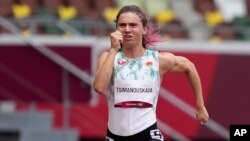Belarusian Olympic sprinter Krystsina Tsimanouskaya said Tuesday she is focused on her safety and seeking refuge in Europe after facing threats from officials at home.
“They made it clear that upon return home I would definitely face some form of punishment,” she told The Associated Press in a videocall interview. “There were also thinly disguised hints that more would await me.”
The 24-year-old said she wants to continue her career as an athlete, with plans to compete in at least two future Olympics.
“For now, I just want to safely arrive in Europe ... meet with people who have been helping me and make a decision what to do next,” Tsimanouskaya said.
Polish authorities granted her a humanitarian visa to seek political asylum on Monday after she alleged her team’s officials were trying to force her to fly home to Belarus against her wishes.
Tsimanouskaya told officials in Tokyo she feared she would not be safe in Belarus from the autocratic government of President Alexander Lukashenko.
An activist group said it had bought Tsimanouskaya a plane ticket for a Wednesday flight to Warsaw.
U.S. Secretary of State Antony Blinken tweeted late Monday that the Lukashenko government was trying to “commit another act of transnational repression” by forcing Tsimanouskaya to leave “simply for exercising free speech."
“Such actions violate the Olympic spirit, are an affront to basic rights, and cannot be tolerated,” Blinken wrote.
The political drama unfolded after Tsimanouskaya criticized how officials were managing the Belarusian Olympians, provoking a backlash in state-run media back home, where the government often cracks down on critics.
The Belarus National Olympic Committee has been led for more than 25 years by Lukashenko and his son, Viktor.
On her Instagram account, Tsimanouskaya said she was put on the country’s 4x400 relay team even though she has never raced in the event.
Belarusian officials apparently took Tsimanouskaya to the Tokyo airport, but she refused to board a flight for Istanbul and instead approached police for help.
“I was put under pressure, and they are trying to forcibly take me out of the country without my consent,” the 24-year-old runner said in a video message posted on social media.
Later, late Monday afternoon local time, she was taken to the Polish embassy in an unmarked silver van and stepped out with her official team luggage. Two women, one carrying the red and white flag considered the symbol of opposition in Belarus, came to the gates to support her.
Tsimanouskaya told a Reuters reporter via Telegram the Belarusian head coach showed up at her room Sunday at the athletes’ village and told her she had to return home.
“The head coach came over to me and said there had been an order from above to remove me,” she wrote in the message. “At 5 [p.m.] they came my room and told me to pack, and they took me to the airport.”
But Tsimanouskaya refused to board and sought the protection of Japanese police at the airport.
Belarus was widely condemned by Western governments in May when it diverted a passenger jet carrying an opposition activist and his girlfriend that was flying over the country and forced it to land. Given the reports in the Belarusian media about Tsimanouskaya’s complaints about the management of the country’s team, she said she feared for her safety if she returned home.
“The campaign was quite serious and that was a clear signal that her life would be in danger in Belarus,” Alexander Opeikin, a spokesman for the Belarusian Sport Solidarity Foundation, told the Associated Press.
Through the years, athletes from authoritarian nations have often sought political asylum in other countries while they were competing at the quadrennial summer Olympics or other global sporting events. It happened frequently during the Cold War but also at Olympic Games since then.
Some information in this report came from the Associated Press and Reuters.






